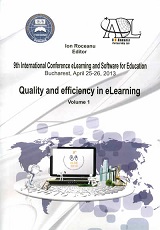DEVELOPMENT OF THE AFFECTIVE COMMUNICATION BY THE USE OF EDUCATIONAL SOFTWARE FOR THE DOWN SYNDROME AFFECTED CHILDREN
DEVELOPMENT OF THE AFFECTIVE COMMUNICATION BY THE USE OF EDUCATIONAL SOFTWARE FOR THE DOWN SYNDROME AFFECTED CHILDREN
Author(s): Florin Emil VerzaSubject(s): Education
Published by: Carol I National Defence University Publishing House
Keywords: down syndrome; affective communication; educational software
Summary/Abstract: In our work we have formulated the general objective to develop affective communication in the children with Down syndrome by presenting educational software that motivate the desire to communicate and interrelate with others which can be a trigger vector to stimulate speech and expression of attitude towards the surrounding world. Therefore, we formulated two hypotheses: 1. Considering the love of the children with Down syndrome for animals and their ability to imitate others, we assumed that educational software facilitate children's desire to interact through nonverbal communication and through an expression of a state of mind based on simple verbal structures dominated by prosodic elements; 2 We assume that learning affective communication generates a progress in the direction of understanding the world around them and becomes a catalyst factor for their desire to learn. In order to decipher these purposes we conducted a research on a group of 30 children with Down syndrome aged between 8 and 10 years. We used in the therapy program, through the educational software, several activities involving different animals in different situations and several children who expressed a positive attitude towards them using petting, touch, gesture, intonation and verbal exclamation, short words which expressed appreciation and the animals responded using characteristic sounds and "words" of thanks. In the next step we followed subjects undergoing investigation in real situations in order to verify that those things acquired through educational software extend to everyday circumstances. After applying the above tests we found out that the two hypotheses were tested, this fact meaning that the educational software have contributed to shaping the affective communication and to performing a significant leap in diversifying their attitudinal expression towards the surroundings. We discovered that there was an increased desire to have contact with others and to express preferences using more verbal expressions similar to human characteristics.
Journal: Conference proceedings of »eLearning and Software for Education« (eLSE)
- Issue Year: 9/2013
- Issue No: 01
- Page Range: 138-142
- Page Count: 5
- Language: English

